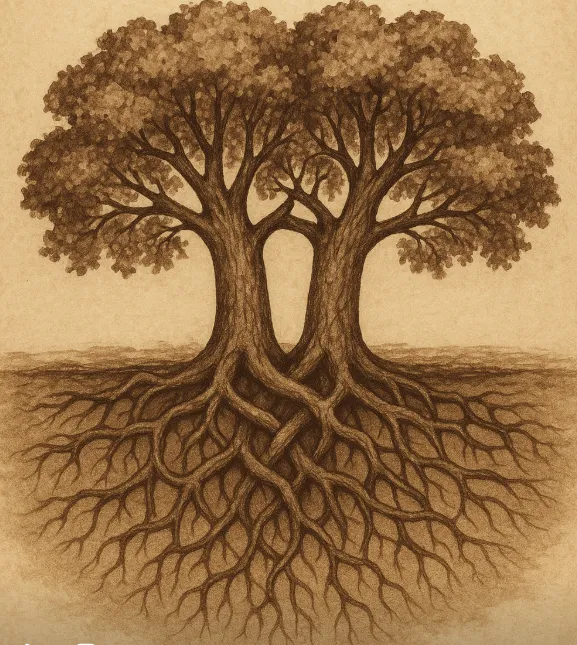The Deepening of Trust - It's Something We DO
 Trust isn’t just a thing you have. It’s something you do.
Trust isn’t just a thing you have. It’s something you do.
It’s an action. A practice. A risk. A choice.
And like most important things, trust doesn’t show up all at once—it deepens over time. Sometimes quickly, sometimes slowly. But always through repeated gestures, shared moments, and the kinds of small decisions that tell us: you’re safe here. I see you. We’ve got this.
That’s especially true in collaborative settings—communities, coalitions, networks—where relationships are the infrastructure. You can have all the vision and strategy in the world, but if trust is thin or broken, the gears grind. If trust is strong, though, people take chances. They speak up. They hold each other in hard moments. They build something real together.
So the question becomes: how do we actually build and deepen trust?
From experience across a wide range of collaborative spaces, we’ve found that trust deepens most reliably through four core ingredients: reliability, openness, care, and appreciation.
Let’s take a closer look at each.
🧱 Reliability: Keeping Your Word, Respecting the “No”
Section titled “🧱 Reliability: Keeping Your Word, Respecting the “No””We often think of trust as something intangible, but one of its clearest foundations is very practical: Do you follow through?
When someone shows up consistently, meets a deadline, responds when they say they will—it builds confidence. Even small acts, done reliably, say: you can count on me. And over time, that steadiness becomes the spine of trust.
But reliability isn’t about always saying “yes.” In fact, trust also deepens when someone says “no” clearly and respectfully—and we honor that boundary. It reminds us that a “yes” has real meaning. That we’re not performing for one another, but showing up with integrity.
Trust grows when people do what they say—and when they say only what they mean.
🔍 Openness: Sharing Honestly, Listening Fully
Section titled “🔍 Openness: Sharing Honestly, Listening Fully”Even the strongest relationships hit bumps. Conflict, tension, misunderstandings—they’re inevitable. What keeps these moments from breaking trust is openness.
Openness means being willing to say what’s on your mind—especially when it’s uncomfortable. It means not hiding behind masks or professionalism, but being real, even if that means being vulnerable. And it also means being open to others: listening without defensiveness, letting new perspectives in.
For people who’ve been hurt or marginalized, openness isn’t always safe or possible—and that’s okay. It’s not about forced transparency. It’s about making space, when we can, to risk a little honesty. Because when we do, we create conditions where others can do the same.
Openness is the bridge between difference and understanding.
💗 Care: Acting from a Place of Mutual Concern
Section titled “💗 Care: Acting from a Place of Mutual Concern”Trust doesn’t grow in sterile rooms. It grows in warmth. In feeling like the people around you care—not just about the task, but about you.
Sometimes we can’t trust a person right away, but we can trust what they care about. Their community. The values they carry. The integrity they show in small moments. That kind of care is a signal: I may not know you yet, but I can feel you’re rooted in something real.
Care is also how we repair harm when trust is broken. Acknowledging hurt. Making amends. Doing the hard, unglamorous work of rebuilding. Without care, these steps are performative. With care, they become sacred.
Care says: we’re not just getting things done—we’re holding each other, too.
🌼 Appreciation: Seeing Each Other in Full Color
Section titled “🌼 Appreciation: Seeing Each Other in Full Color”Finally, appreciation. Not the polite kind. The real kind.
Appreciation is recognizing what someone brings, just as they are. It’s celebrating difference—not as a checkbox, but as a blessing. It’s naming the quiet work, the unique perspective, the unexpected contribution. It’s pausing to say: you matter.
And when people feel seen, they show up more. They take risks. They relax into themselves. Trust deepens.
In networks especially—where people come from so many different places and backgrounds—appreciation is how we weave the thread that holds us together. When we truly value one another, trust becomes not just possible, but inevitable.
✨ Trust Is a Risk—and a Gift
Section titled “✨ Trust Is a Risk—and a Gift”Of course, choosing to trust isn’t easy. Most of us have been burned. Some of us carry deep wounds or inherited trauma that make trust feel dangerous.
That’s real. That’s valid.
But even still, many of us keep showing up. And in that showing up, we make a choice: to try again. To trust just enough to get started. Because collaboration without trust is like building a house on sand. But with trust—even tentative, imperfect trust—we can build something beautiful.
So let’s keep practicing:
-
Be reliable.
-
Be open.
-
Show care.
-
Offer appreciation.
One action at a time, one person at a time, one leap of faith at a time—we deepen trust. Together.